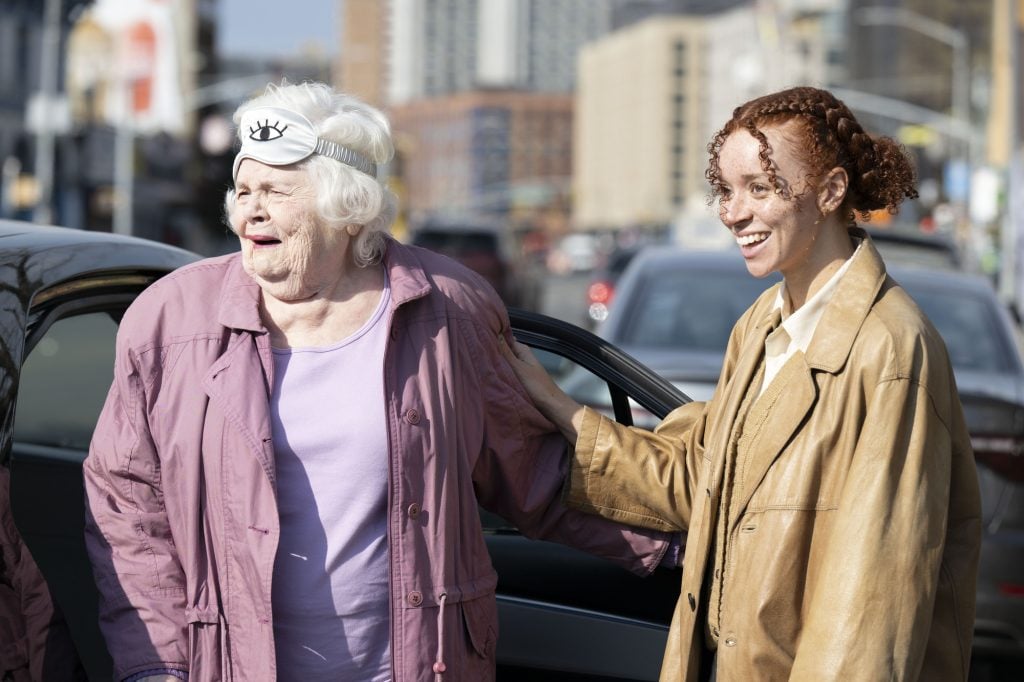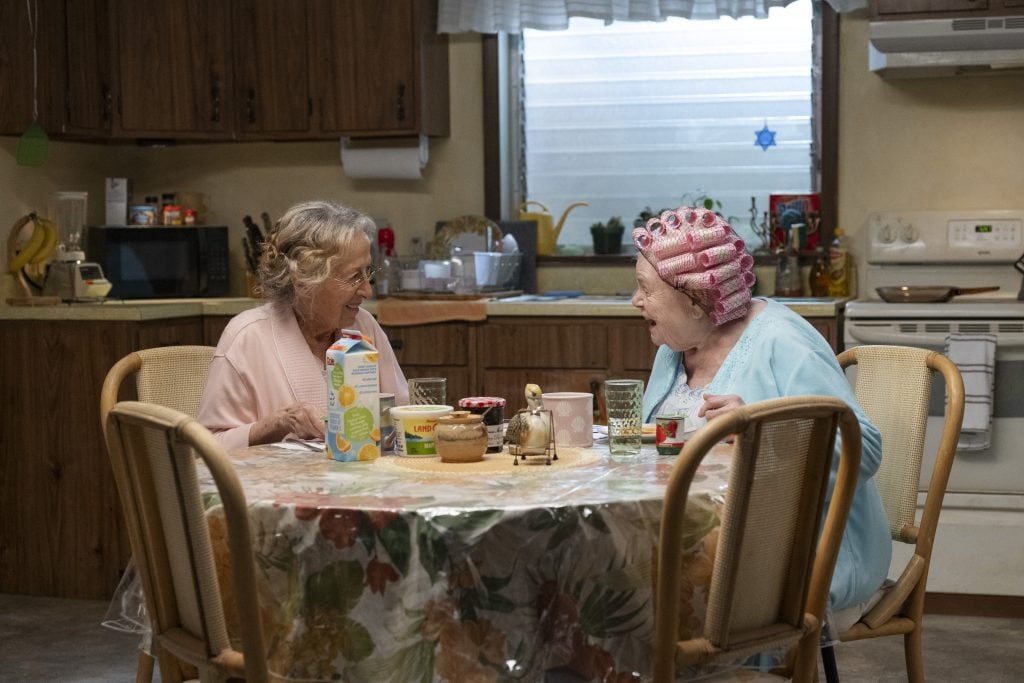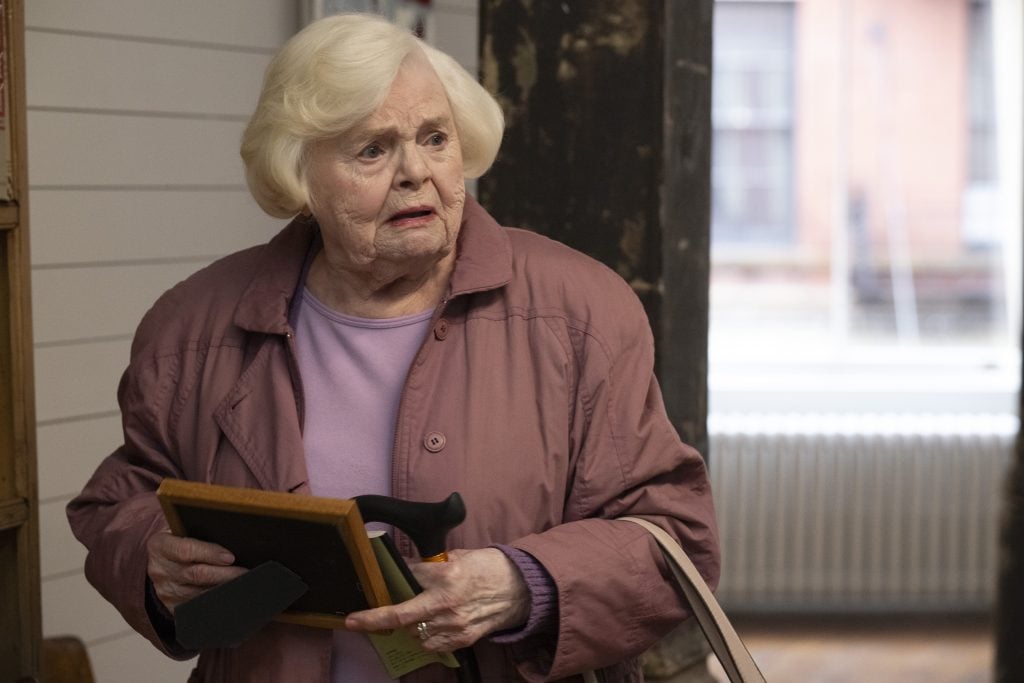June Squibb is a treasure. Her infectious zeal and zest brighten our screens. She reminds us each time she performs what a marvelous actress she is — and at ninety-four, her performances keep hitting those high notes. It is to that end that in Eleanor the Great, she marshals her talents into a role imbued with poetry and introspection. It is a film that muddies its tones. The story cannot decide whether to be a light comedy or a poignant drama; Squibb strikes a perfect harmony. The story balances a tender story of grief and grace. While it leans into sentimentality a little too strongly, what it unquestionably achieves is a career-best for the warm-hearted and versatile actress.
We find Eleanor (Squibb) reeling from the death of her best friend, Bessie (Rita Zohar). They are lifelong friends who have been living together in Florida since the death of both their husbands. Eleanor now finds herself moving back to Manhattan to live with her daughter and grandson. The arrangement is only temporary, with Lisa (Jessica Hecht) planning to find her a place in an assisted living home in the city. Eleanor’s arrival is a clash of styles and personalities. She speaks her mind (sometimes bluntly) and tends to bend the truth. This rigor leads her to attend a Jewish Community Center event. After declining a singing group, she ends up inadvertently joining a support group.

Image: Anne Joyce. Courtesy of Sony Pictures Classics
As the group asks her to open up and share her story. Eleanor shares a story of surviving the Holocaust, which endears her to Nina (Erin Kellyman), a local journalism student researching the group for her paper. Eleanor’s story of survival moves the group, but the problem is that it is not her story, but rather Bessie’s. By telling Bessie’s story as though it were her own, Eleanor now finds herself in a growing spotlight, as well as a budding friendship with Nina, who seeks to write a story about her. When things go too far, Eleanor must confront the truth and come to terms with her deceit.
Herein lies the challenge for Eleanor the Great: the film asks a lot of its audience to adjust to the conflation of comedic and dramatic tones, while also asking a lot from our protagonist, Eleanor. The movie makes no qualms about her actions being reprehensible, to say nothing about the dishonest nature of it all. The presence of Squibb does not absolve the character’s actions. Still, her performance in the role is endearing. It is easy to imagine the character not garnering much sympathy if played by another actress. Squibb is a natural charmer, and she creates a permission structure that allows the audience to be both repulsed by Eleanor’s deceit and understanding of her grief and reasoning.

Early in the film, Eleanor remarks to her daughter, “What am I going to do here all day alone?” Eleanor’s delivery is marked by witty incredulity, but the sentiment gets to the plain facts that affect many people as they age, particularly as the twilight years approach. It is through this revealing statement that Eleanor finds herself searching for purpose. It also leads to things getting out of hand.
Eleanor befriends and is befriended by Nina. Their time together is marked by remarkable candor about life, even as she recounts Bessie’s story as if it were her own. The kinship that unites Eleanor and Nina proves to be stronger despite the former’s deceit. Nina, having lost her own mother recently, finds herself at odds with her father (Chiwetel Ejiofor). However, she can confront her grief and find her footing again through her time with Eleanor.

Image: Anne Joyce. Courtesy of Sony Pictures Classics
The thematic decision to memorialize Holocaust survivors in this film is a poignant choice. However, that story often feels at odds with the one about confronting grief and unspooling a story as though it were her own. This element is likely to detract from the story’s focus. The narrative would work better without the presence of light comedy. There is, however, a level of earnestness to it all that holds the film together. It is ultimately enough for a satisfying story of heartbreak, pain, and grace.
Scarlett Johansson makes her directorial debut with Eleanor the Great. While there is unevenness throughout, for a first film, she holds a remarkable steadiness in arriving at a central theme. Johansson spotlights the idea that Eleanor states in the movie: ‘You have to talk about the things that make you sad.’ Johhanson threads heartbreaking tenderness and triumph in the face of grief, all the while giving deference to her lead actress to understand when to pull and when to leave a thread hanging. Whether it’s personal pain or a tragic event, there needs to be a space for opening up and talking. The film captures this dichotomy through the loss of a friend and reckoning with one of the worst events in human history.
Scarlett Johansson shows a promising start to a directorial career. In Eleanor the Great, she creates an affecting film. Thanks to its narrative, which will either discourage or hearten audiences. Johansson cuts her teeth, and one pillar is unshakable. June Squibb proves that, like a fine wine, her performances only get better with age.
Eleanor the Great is currently playing in theaters courtesy of Sony Pictures Classics.
Scarlett Johansson shows a promising start to a directorial career. In Eleanor the Great, she creates an affecting film.
-
GVN Rating 7
-
User Ratings (0 Votes)
0

Writing & podcasting, for the love of movies.
His Letterboxd Favorites: The Dark Knight, Halloween, Jaws & A Christmas Story.






